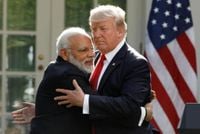In a week marked by sharp commentary from global security experts and former policymakers, the United States’ approach to South Asia has come under renewed scrutiny. As the Biden administration navigates a region rife with shifting alliances and simmering rivalries, voices from both sides of the India-Pakistan divide are questioning the wisdom of Washington’s longstanding strategic bets—and warning of the risks ahead if it fails to adapt.
John Bolton, the former US National Security Adviser, minced no words when assessing Indian Prime Minister Narendra Modi’s recent meeting with Chinese President Xi Jinping at the Shanghai Cooperation Organisation (SCO) summit. According to The Economic Times, Bolton described the encounter as a “propaganda success” for Beijing, arguing that the optics reinforced China’s image of stability on the world stage—particularly when contrasted with what he called the “erratic” Trump administration. For Xi, it was a public relations coup; for Modi, a calculated move. But for Washington, Bolton warned, the real threat lies in the deepening partnership between “a very weak Russia and a much stronger China.”
Bolton’s assessment comes at a time when the United States is reconsidering its diplomatic representation in India. He was openly critical of the White House’s appointment of Sergio Gor as the new US ambassador to India, stating that Gor, a former presidential personnel officer, “lacks the depth of experience for such a high-profile posting.” Bolton argued that a senior business leader or a political figure with close ties to the administration would have been far more effective in advancing bilateral relations. “Gor’s appointment could prove an obstacle to building momentum in bilateral relations, even as embassy staff take on the heavy lifting,” he cautioned, as reported by The Economic Times.
Perhaps more telling was Bolton’s skepticism about the current administration’s strategic clarity on China. He observed that former President Donald Trump continues to prioritize the possibility of an economic deal with Beijing—a goal pursued in his first term as “the biggest trade deal in history.” Yet, Bolton argued, China’s military build-up, its growing navy, threats to Taiwan, and pressure along India’s Line of Actual Control all signal a long-term bid for regional dominance. This, he insisted, underscores the urgent need for stronger coordination through the Quad—a security grouping that brings together India, the US, Japan, and Australia. “The rise of a China-Russia axis must be treated as a shared concern,” Bolton emphasized.
On the diplomatic front, Bolton also weighed in on Trump’s outreach to Pakistan’s military leadership, including a lunch hosted for Army Chief Asim Munir. While acknowledging Washington’s interest in countering greater Chinese influence in Pakistan, Bolton called it a mistake for Trump to claim credit for calming tensions between India and Pakistan after the Kashmir attack. “The US must avoid the perception of tilting to either side and instead maintain equal relations with both,” he said, warning that missteps could further destabilize the region.
Meanwhile, across the border, former Pakistani National Security Adviser Dr. Moeed Yusuf delivered a stinging critique of US policy in the pages of Foreign Affairs magazine. On September 11, 2025, Yusuf argued that the US’s “long-standing strategic bet on India has failed” and called for a “balanced partnership with Pakistan”—one he believes could help stabilize South Asia and even foster a more constructive US-China relationship. “The US bet on India has not paid off. Instead of becoming a steadfast partner to counterbalance China, India has pursued an independent and often divergent foreign policy,” Yusuf wrote.
Yusuf pointed out that despite heavy US investment—ranging from civil nuclear deals to waivers on Russian arms purchases—India continues to resist aligning fully with American interests. He cited India’s neutral stance on Russia’s 2022 invasion of Ukraine and its growing ties with both Moscow and Beijing as evidence that the Modi government’s foreign policy is driven by a desire for “strategic autonomy” rather than a clear alignment with the US-led global order. “These divergences are not accidental; they are derived from India’s long-standing commitment to what it considers strategic autonomy in foreign policy,” Yusuf explained.
He identified three faulty assumptions that have defined US policy toward the region over the past two decades: that India would rise unconditionally as a counterweight to China, that Pakistan would naturally align with Beijing, and that Pakistan’s record in Afghanistan made it an unreliable partner. According to Yusuf, these assumptions led Washington to isolate Pakistan and enabled India’s increasingly aggressive posture—including military strikes inside Pakistani territory and a more confrontational rhetoric. As a result, Islamabad has deepened its ties with Beijing, now sourcing 80% of its new arms from China—a dramatic shift from its previous Western dependence.
Despite strained ties, Yusuf noted a shift under President Trump, who made overtures to Pakistan’s military leadership and brokered a temporary ceasefire between India and Pakistan in 2025. This thaw, he argued, reflects a growing realization in Washington that its India-first policy has limited utility. “Pakistan’s history as a bridge between Washington and Beijing—most notably during Henry Kissinger’s 1971 secret visit to China—shows it can again play the ‘role of regional fixer,’” Yusuf wrote. He highlighted Pakistan’s 2022 National Security Policy, which explicitly rejects bloc politics and promotes economic connectivity and regional cooperation—an approach he says aligns with American interests in promoting stability, open trade, and counterterrorism.
Yusuf proposed that the US could reduce tensions over China’s investments in Pakistan—particularly the China-Pakistan Economic Corridor (CPEC)—by launching parallel or complementary infrastructure projects in the region. Shared investments in regional connectivity, he argued, could transform Pakistan into a commercial crossroads benefiting US, Chinese, and even Indian interests. He also pointed to opportunities for collaboration in counterterrorism and resource extraction, especially in mineral-rich areas like Reko Diq.
But the risks of sticking with the old playbook are real, Yusuf warned. A continued US tilt toward India could exacerbate the risk of full-scale war in South Asia, particularly as India remains fixated on its rivalry with Pakistan. He stressed that unless the US encourages India-Pakistan dialogue to resolve longstanding disputes—from terrorism to Kashmir to water-sharing—the region will remain trapped in a dangerous cycle. “Only a balanced US approach—grounded in pragmatism and shared interests—can ensure long-term stability in South Asia and safeguard American influence in the region,” Yusuf concluded.
Bolton, for his part, also commented on Israel’s ongoing campaign in Gaza, which many governments and rights groups have criticized as disproportionate. He argued that Israel has a legitimate security objective in dismantling Hamas as both a political and military force, but warned that it is losing the “information war.” According to Bolton, Israel must do more to communicate its objectives clearly to the international community.
As the US weighs its options in a region where every move is scrutinized by rivals and allies alike, the calls for recalibration are growing louder. Whether Washington can craft a new, more balanced strategy that accounts for the realities on the ground—and the aspirations of both India and Pakistan—remains to be seen. But one thing is clear: the stakes for South Asian peace, and for America’s own global standing, have rarely been higher.




